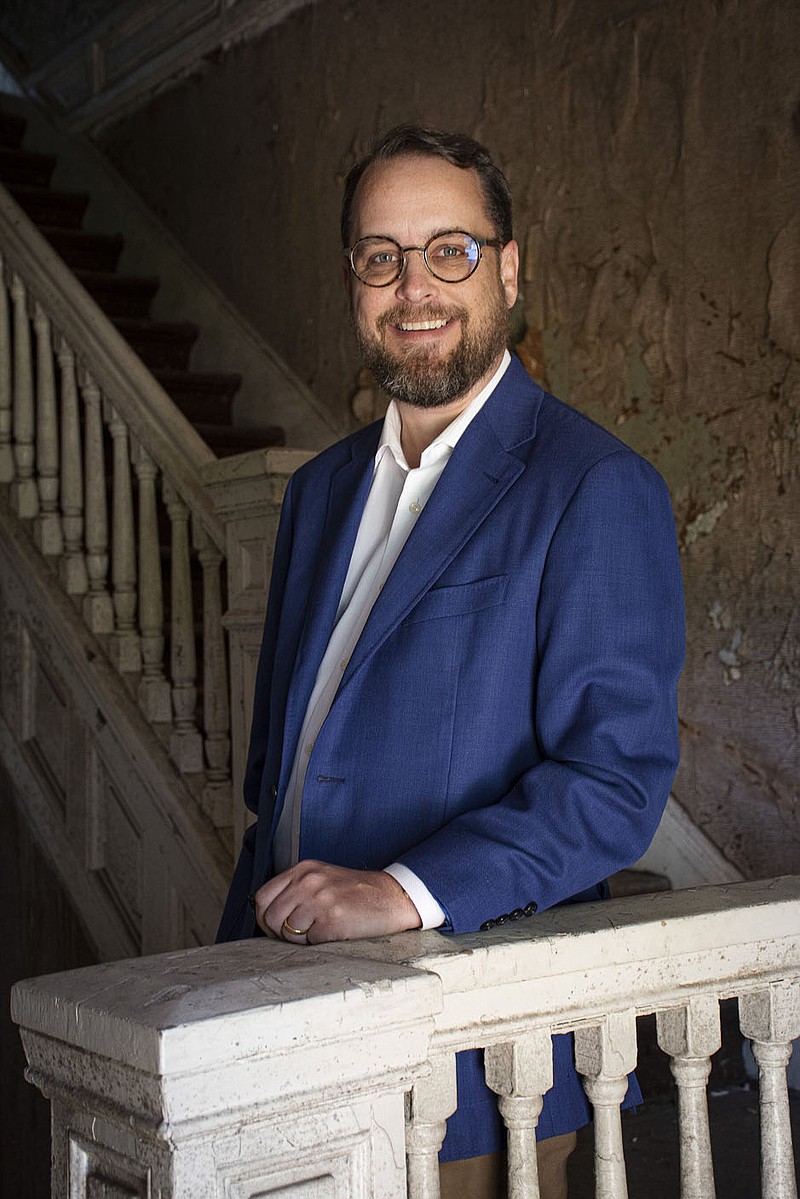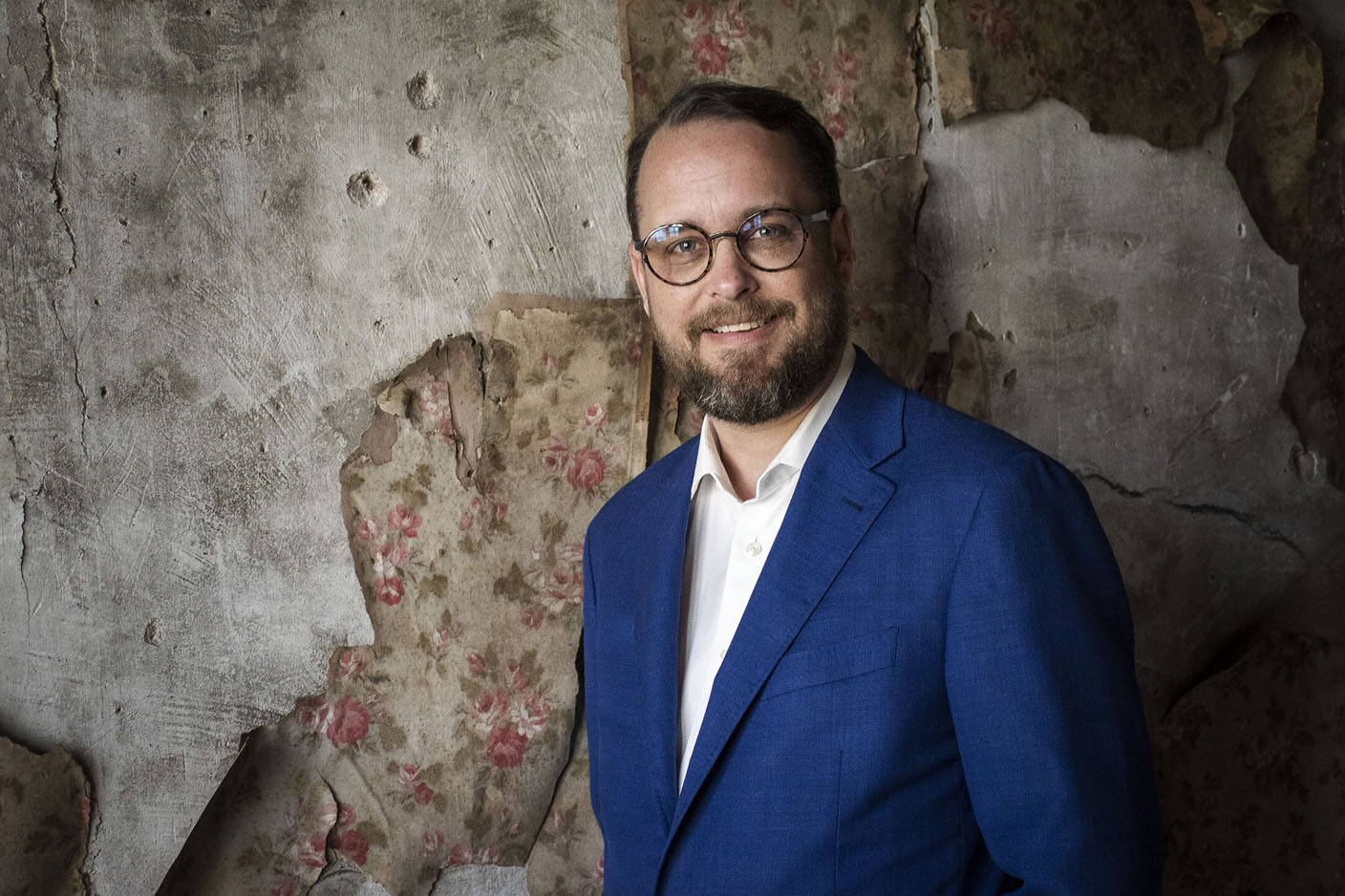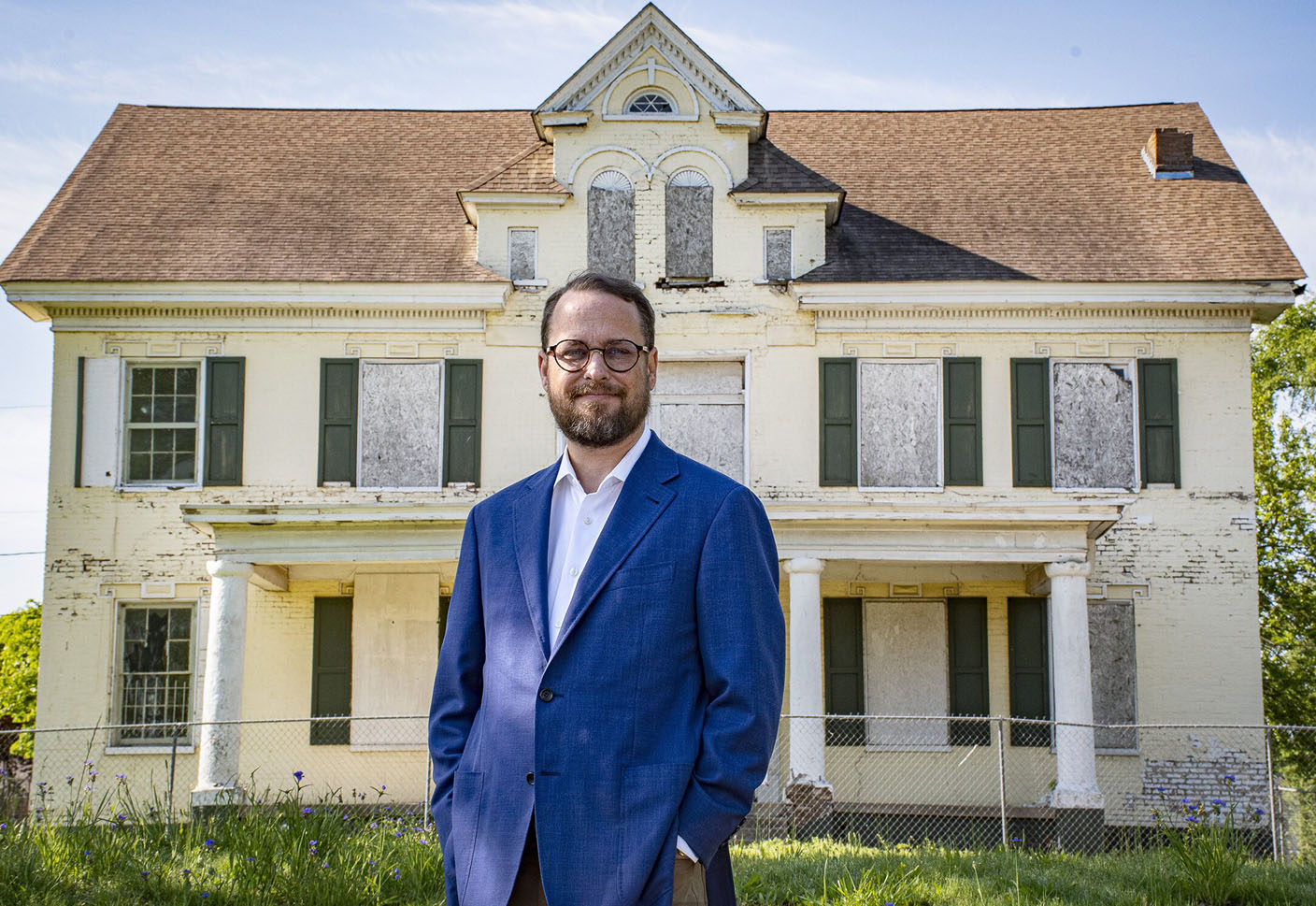To drive through downtown Little Rock these days is to see a city leaning into its own reinvention. Multiple cranes hover above the Arkansas River, part of the massive Interstate 30 bridge replacement, a project that has radiated new energy into the city's core. Nearby, the River Market hums with activity day and night while other pockets of the urban district on both sides of Interstate 630 bristle with new restaurants, residences and office space -- or speak of such things to come.
David Robinson beams over these advancements like a new parent, for that's what the 44-year-old real estate developer and broker is, a sort of foster father to the urban renewal and present doings of downtown. It wasn't so long ago the neighborhood languished under clapboard facades and dusty, vacated spaces, but through Robinson's work with Block 2 Real Estate and his activism through the Quapaw Quarter Association, the marquee neighborhood of the state's capital city is slowly, surely, gaining its second wind.
"When we started this deal, you could shoot a shotgun down Main Street and hit nothing but tumbleweeds and regret, and that never made sense to me," he says. "We had these beautiful buildings. People need to live in these buildings. We can convert these buildings into spaces where people reside, and that brings life back to the street.
"This is a story that's been written all over the country, so why not beg, borrow and steal ideas? There's no plagiarism rule in real estate. If somebody gets it right somewhere else, bring it here."
As he speaks, Robinson leans in, physically conveying the urgency and passion he's always felt on the subject of historic downtown. He talks in torrents, words and ideas and strategies and visions for the future all tumbling out as if a coiled spring had been loosed, propelling thoughts from his mind to the world. Downtown is a pet project he's devoted the better part of his career to, and it's still a legacy in waiting for anyone who would take part in its renewal, naysayers be damned.
"Everybody thought we were crazy, and we were. I think you must be a little crazy to try to do what we did," he says of his years working to repurpose historic properties. "I gave an interview years ago, and somebody said, 'How are you going to pull this off?' I said, 'We bit off more than we can chew. We're crazy; we're either going to do it in amazing style or we're going to flame out spectacularly. It's probably going to be a little of both,' and it was.
"We weren't the first guys to try to revitalize Main Street, and I wouldn't say we did it perfectly. There's lessons I learned where I would do it differently today. But now we also have a place where people come and they don't feel unsafe. We've got downtown ambassadors walking the streets. It's amazing to me to see the difference."
SEEING INTO THE FUTURE
"Little Rock is going to look back in 50 or 100 years and be thankful that it's preserved its history," said Joe Carter, a serial entrepreneur who's been Robinson's friend for 15 years. "Little Rock is going to be thankful for foot soldiers like David Robinson that helped preserve everything from some of those beautiful homes in the Capitol District to Main Street.
"If you think about the future of downtown Little Rock, it's hard to imagine what it would be without David. But it certainly wouldn't be as rooted in history as it will be because of his efforts."
Robinson was born in 1979 in Little Rock, the latest of six or seven generations of his family to call Arkansas home (he forgets which). He grew up in a neighborhood where the edge of development dropped off sharply, but what's today merely considered west Little Rock..
"It was kind of a little boy's paradise," he says. "Lots of kids running around on bikes, not as much traffic as we see today. I remember riding a four-wheeler up and down Chenal Parkway when they were laying that road out."
Robinson's school year experiences included, as a junior in high school, serving in Washington, D.C., as a page for Sen. Dale Bumpers. Upon graduating from Pulaski Academy in 1998, he spent two years on a scholarship to the University of Arkansas studying what would now be called Middle Eastern studies. But he failed to connect with his studies and appealed to his former mentor Bumpers, who was teaching there at the time. Bumpers made introductions that eventually landed him abroad at the University of St. Andrews in Fife, Scotland.
"I applied to attend the University of St. Andrews as a transfer student my junior year at Fayetteville, and I had to do two years in one year at St. Andrews to get caught back up," Robinson says. "I lived in Scotland from 2000 through 2004, effectively. I didn't come back a lot. It was a pretty interesting time."
Robinson, who would earn both an undergraduate and a master's degree abroad, says he never felt ostracized for being a foreigner despite the radical differences in education protocol and societal norms between Europe and America. To the contrary, he fascinated his classmates, curious as they were about Southern life and culture.
"They called me 'Arkansas Dave' because they thought I was so unique. They didn't know anybody from Arkansas," Robinson says. "I had a little bit of a Southern twang, and I didn't try to hide that. I didn't apologize for wearing cowboy boots and jeans. That's who I was. I think they valued the authenticity.
"We'd make fried chicken at our house, and all the students would want to come over and eat because they didn't have that concept. I remember I brought Ro-Tel and cheese dip over there, and at the time in Scotland that was a novelty; they didn't know what to do with it, but they thought it was amazing. I cooked a brisket and people were like, what is this? Being an Arkansan was an asset rather than a hindrance."
For his part, Robinson immersed himself in clubs and extracurriculars, which he considered more useful -- to say nothing of more fun -- than unduly obsessing over his lessons.
"I wanted the full experience. I wanted to be a part of many clubs. I wanted to go out. I wanted to have friends," he says. "I was a good student and graduated with honors, but I wasn't one of those guys who would lock himself in the library."
His original plan was to head into government work, but as his applications to various U.S. agencies slowly worked their way through the system, he got the chance to work on Gen. Wesley Clark's presidential campaign. Assigned to Florida operations, he proved an adept fundraiser right up until Clark got out of the race. He worked briefly for Sen. John Kerry before the allure of campaign work began to wear off.
"I looked up and said, 'Do I want to live this itinerant cold-pizza-and-cigarettes lifestyle, out of my car?'" he says. "In retrospect, I probably would've made a lot more money being a political fundraiser, because that can be pretty lucrative. But instead, I asked myself what industry I could get involved with that I had an interest in? It was real estate."
COMING HOME
After brief stints in Florida and Texas, Robinson returned home to Little Rock to take a position with the commercial real estate firm Flake and Kelley where he'd serve and learn under Hank Kelley, one of his primary mentors.
"God bless Hank," Robinson says. "I was insufferable. Like every 26-year-old with a master's, I thought I knew everything, and I was happy to tell you about it. But Hank has the patience of a saint. He took me on and for 10 years I got a real on-the-ground education understanding commercial real estate and real estate development."
"David came to us new to the brokerage business, but just wide open and ready to learn and just dove into it," says Kelley, now CEO of Kelley Commercial Partners in Little Rock. "His aptitude for anything that had to do with historic properties and history in general was just off-the-charts strong.
"David has this unquenchable thirst for collecting and understanding history, and I love that. He was really interested in not only how he could make a transaction happen, but he had a huge heart and focused on the impact of his work on the community at large."
Robinson next partnered with Scott Reed of Reed Real Estate Advisors and played an integral role in the company's acquisition of the 500 block of Main Street and the K Lofts Building at 315 Main St. Among the historic properties acquired were the M.M. Cohn Building, the Boyle Building, Hall Davidson Buildings, and the Arkansas Building, which was the old Pfeifer Brothers department store. Though the neighborhood was hardly glamorous, Robinson was working in the kind of real estate he loved most.
The company, however, would struggle to meet its financial obligations, and Robinson would form Block 2 Real Estate and seek out other partners as a way to preserve both the redevelopment projects and his career.
"My money was all tied up in these deals on Main Street, I was newly married, and I didn't know how I was going to pay for life," Robinson says. "So, I ended up doing a work-around and brought in some new partners from Portland. We recapitalized deals, we were able to buy out Scott, buy off all the bad debt. I think we owed $1 million to the contractors. We were able to finish the core projects, which was about 100 apartments on Main Street."
Another positive that came out of this stressful period of his career was the opportunity it gave him to help create a historic district downtown. This designation opened up access to tax credits that are essential to developers in getting projects done. As time has gone on, Robinson has become both expert and pied piper for such financing strategies.
"When we started those projects, I didn't know anything about historic development or tax credits," he says. "Today, tax credits have become the core mechanism, both state and federal, that allow for anyone to redo these historic buildings."
The effort to redevelop his own properties, later to include structures on the 300 block of downtown, naturally led him to the Quapaw Quarter Association, a 55-year-old organization dedicated to historic preservation in greater Little Rock. The QQA advocates at the local, state and federal level for preservation incentives that encourage adaptive reuse of historic structures and offers a wide range of programs and services to help property owners and others interested in historic preservation. And its annual Tour of Homes, this year slated for May 13-14 rooted in the Capital View and Stifft Station neighborhoods, helps shine a light on the historic architecture throughout the city.
Among the accomplishments the QQA has achieved is lowering the threshold for owner-occupied historic properties from $25,000 to $5,000 to qualify for state tax credits to help pay for repairs and upgrades. It's also helped refine state incentives and advised the Arkansas congressional delegation on the importance of retaining federal rehabilitation tax credits in recent years. These measures are particularly important tools in staving off gentrification and decay in core neighborhoods, and there is no more vocal proponent of them than Robinson.
"Creating a historic district will radically change a neighborhood," he says. "I talk about tax credits until I'm blue in the face. I tell homeowners all the time, just call me; I'll help you, for free."
As his second term as QQA president comes to a close, and with it his ninth year on the board, there's much that Robinson can point to that the organization has done to maintain the history of the city through its preservation and repurposing of buildings. These include the Gay Oil Building, Murphy Jeffries Building, Taber-Patterson House, Johnswood and Woodruff House all directly or indirectly saved by the QQA. With his compatriots on the board, and through his development work, Robinson has contributed to and led others to transform the city's core neighborhood one building, one block at a time.
"I remember on the 300 block, there was a liquor store that would sell liquor by the glass. You walked down that street, it smelled like a urinal," he says. "And now what's on that street? It's restaurant row; there's great restaurants and even though some have come and gone due to covid, when one closes there's another one ready to go in there."
BABIES GROW UP
Robinson experienced a dramatic shift in his professional life at the end of last year when the partnerships at last sold off the Main Street properties. And while he's eager to see how the new owners carry forth what he and his madcap contemporaries laid the groundwork for, it's bittersweet to take in the view from the sidelines.
"It's hard; they're still my babies even though we sold them all," he says. "I'll always feel connected to them because I spent a decade of my life battling that street and trying to get stuff done."
But for all of the respect he pays to the past, Robinson is loathe to live in it. Therefore, he doesn't dwell on what's been done so much as what's left to do, opportunities he's eager to embrace.
"Downtown runs hot and cold. We still have crazy guys like me who will try things, it just goes in waves. It's the nature of development," he says. "But we're taking the right steps, and I think we're moving the football incrementally down the playing field. Could we do more? Could it happen quicker? Yeah. Those are things that we're advocating for in the QQA right now."
Most of all, Robinson hopes to develop a similar passion for history and quality of place in future generations, to inspire young people with an interest in architecture or development or even public service to adopt a preserve-and-protect mentality toward core neighborhoods, just as he's tried to do. And, in at least one case so far, he's succeeded.
"My daughter, Sarah, is 7," he says. "She goes around with me to projects and she'll look at things and she'll tell her friends, 'Daddy takes old things and makes them new.' That gets me welling up a little bit, that childlike appreciation of the place that you're from. I don't want her to lose that.
"I want her to have a sense of purpose when it comes to valuing where she lives. I never want her to look at something as too far gone, with this throw-away mentality, tear it down and start over. That might ultimately be the answer, because you can't save everything, but I want her to start with the mentality of 'There's a story here; I wonder what it is and can I be a part of it?' That's kind of the thing I would love."
__
David Andrew Robinson
FAMILY: Wife Alejandra Robinson; daughter Sarah Robinson; dog Cooper.
MY FAVORITE MOVIE IS: "The Candidate" with Robert Redford.
A CORE ELEMENT OF A GOOD LEADER IS: Empathy. A good leader must be able to understand and connect with their team on a personal level. Leaders need to show genuine concern for the well-being of others.
A FAVORITE SAYING OF MINE IS: By Abraham Lincoln. It goes, "The best thing about the future is it comes one day at a time."
WHEN I WAS A KID I WANTED TO GROW UP TO BE: Either in politics or the law.
THE ONE THING I KNOW TO BE TRUE ABOUT ALL PEOPLE IS: Everyone wants to be proud of the community they live in.
IF I COULD HAVE DINNER WITH THREE FIGURES FROM HISTORY IT WOULD INCLUDE: Gertrude Stein, Robin Williams and Winston Churchill.
THE BEST ADVICE I EVER GOT WAS FROM: My great-grandfather, V.O. Purvis. He had a saying, "Keep your name out of the paper, your rear out of jail and your soul out of hell."
MY IDEA OF THE PERFECT SATURDAY MUST INCLUDE: An easy schedule and dinner with family and friends.
A GUILTY PLEASURE OR HIDDEN TALENT I HAVE IS: Finding good deals on antiques.
ONE THING I'D CHANGE ABOUT MYSELF IF YOU COULD IS: I honestly wish I was better at sports.
THE FAVORITE PLACE I'VE EVER LIVED IS: Downtown, next to Governor's Mansion in Little Rock. I have never had a stronger sense of community anywhere else.
WHAT PRESERVING HISTORY MEANS TO ME IS: Every place has a story and preserving history and buildings lets that story be told.
ONE WORD TO DESCRIBE ME: Optimistic.



